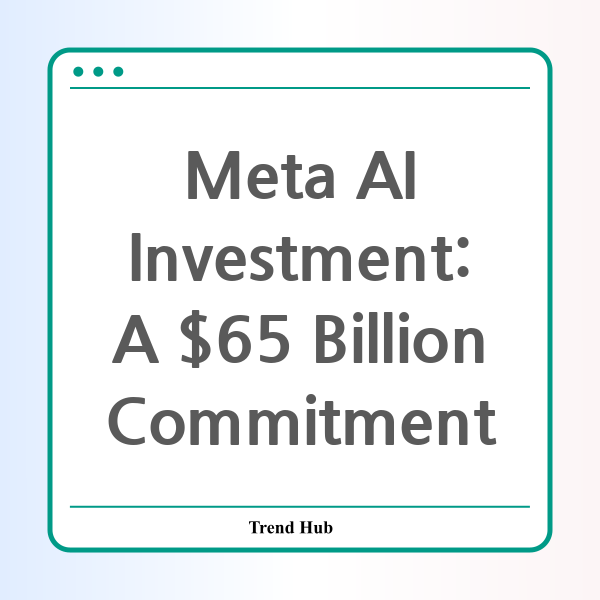* This website participates in the Amazon Affiliate Program and earns from qualifying purchases.

As we delve into the rapidly evolving landscape of artificial intelligence (AI), Meta Platforms has made headlines with its ambitious announcement: an investment of up to $65 billion this year to fuel its AI aspirations. But what does this mean for the tech giant and the industry at large? Is this the dawn of a new AI era, or just another bubble waiting to burst?
Meta's CEO, Mark Zuckerberg, emphasized the company's dedication to becoming a formidable player in the AI race alongside titans like OpenAI and Google. The scale of this investment is unprecedented, with plans to significantly enhance their AI infrastructure, including the construction of a data center large enough to cover a considerable portion of Manhattan!
With this investment, Meta aims to ramp up hiring for AI roles and acquire a staggering 1.3 million graphics processors. This move positions them as one of the top buyers of Nvidia's highly sought-after AI chips, crucial for training and deploying powerful AI models. Zuckerberg's vision is clear: by 2025, his AI assistant could potentially reach over 1 billion users, up from 600 million active users last year. This exponential growth underscores Meta's intent to dominate the AI space by providing tools and resources that are accessible to consumers and businesses alike.
The projected capital expenditure of $60 billion to $65 billion marks a significant leap from the previous year's estimated $38 billion to $40 billion. Financial analysts have also taken notice. The anticipated allocation exceeds the market's expectations, which hovered around $50.25 billion. This ambitious financial strategy is likely to spur innovation and reinforce Meta's position in AI development.
Gene Munster, a prominent analyst, highlighted the ripple effects of Meta's investment on the broader tech ecosystem, particularly benefiting companies like Nvidia, which provide the hardware essential for AI operations. This ecosystem connection indicates that as Meta amplifies its AI capabilities, it also stimulates growth in the supply chain, fostering an environment ripe for innovation.
However, not all are completely optimistic. Analysts warn that with such aggressive investments, there lies a risk of market correction. The tech sector has been known to experience cycles of growth followed by sharp declines, leading some to predict a potential 'bubble burst'. Nevertheless, Zuckerberg remains undeterred, believing that this year's investment will define the future trajectory of AI and technology.
Meta's recent advancements, particularly the introduction of the Llama 3.3 model, which outperforms competitors, serves as a testament to their commitment to innovation. Offering reduced costs while maintaining high performance, this model places Meta in a competitive position against industry leaders such as Alphabet and Amazon.
In conclusion, Meta's $65 billion AI bet is poised to reshape the tech landscape. By investing heavily in AI infrastructure and talent, Meta not only seeks to enhance its own offerings but also to influence the broader market dynamics. For consumers and businesses, this could mean more accessible and advanced AI tools in the coming years. However, as history has shown, it is essential to navigate these waters with caution, keeping an eye on the potential for upheavals in the market. The future of AI is bright, but its path remains uncertain.
* This website participates in the Amazon Affiliate Program and earns from qualifying purchases.